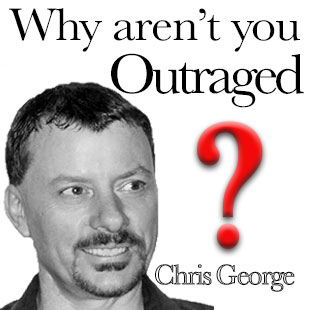
(CHRIS GEORGE / iNFOnews.ca)
January 02, 2018 - 12:03 PM
OPINION
My mother in law, Darlene, was a big believer in common sense. She could look right to the heart of things and immediately find the best way to deal. She died a couple of years ago of cancer, one of the great scourges of modern Western populations. She smoked for a time, she drank diet soda and ate many other foods prepared by the industrial machine we call a culture.
Did this have anything to do with her cancer? Maybe, maybe not. No one has ever done the long term studies to find out. If I had to guess I would say it had more to do with a lifetime spent in our toxic civilization. Pesticides, hormones, pharmaceuticals and fluoride in the water supply, dioxins and sulfur oxides in the air. Living for some years in both Calgary and Kamloops, we could safely add volatile organic compounds and other byproducts of oil and industry to the mix.
So what could we as a society have done to give her a better outcome to her life?
Perhaps if we had adopted something called the Precautionary Principle back when we were building this great industrial machine, we would have done those studies. Perhaps if we had ever had the balls to stand up to corporations, substances like aspartame would still be waiting approval instead of being railroaded through the approval process as a purely political decision. Perhaps we would have applied the same principle when DuPont first came out with the kraft pulp process. Or maybe even applied it to Suncor and the oil sands project. I know the First Nations downstream on the Athabasca River sure would be a lot better off if they had.
I include a link to the complete Precautionary Principle as originally created during a January 1998 meeting of scientists, lawyers, policymakers and environmentalists at Wingspread, headquarters of the Johnson Foundation in Racine, Wisconsin.
The gist of the principle itself is that "...When an activity raises threats of harm to human health or the environment, precautionary measures should be taken..." Many people think that this is already the case, that government regulators already protect the public from cancer-causing substances or incidental toxins produced as part of the myriad industrial processes that manufacturers use to produce the goods we buy. Except for the most egregious cases, they don't.
Interestingly, it is the following statement that is one of the most contentious. "...the proponent of an activity, rather than the public, should bear the burden of proof." The current situation places the consumer in the position of responsibility. We are told to "vote with our dollars". Responsibility for the introduction of toxins into the environment is thus seen as something we are all responsible for. It is, in essence, all our fault for not paying better attention to what happens half a world away or what comes to us in the packaging or the composition of the things we buy.
Conveniently, neither the corporation in charge of production nor the shareholders who benefit from their efforts at generating profit bear any responsibility at all. Attempts to enforce responsibility are met with stiff resistance and platitudes about having consumers make better choices. Often, like in the case of fossil fuels, there is no other choice. Diesel exhaust is a known carcinogen. Benzene, a component of gasoline, is also a known carcinogen. Isn't it lovely that we found out about this almost a century after both came into widespread use?
The Wingspread statement is a common sense statement that is very difficult to argue against. Darlene would have approved. So why, in this age of information and the informed citizenry has it not become the guiding principle for all that we do? How can corporations and governments not follow this in the best public interest?
Money.
If you were looking for a better reason, I don’t have one. As with so much else in our culture, maximizing the corporate return on investment takes precedence over habitat, fresh water, clean air, spotted owls, biodiversity, public safety, doing the right thing, cultures other than ours existing, ethical behaviour, entire species, watersheds, morality, your life and of course, common sense. And what do we get in exchange for looking the other way and not saying anything?
— Chris George believes one measure of a just society is found in how well it balances fiscally conservative economics with social responsibility and environmental soundness in all of its living arrangements.
We welcome your comments and opinions on our stories but play nice. We won't censor or delete comments unless they contain off-topic statements or links, unnecessary vulgarity, false facts, spam or obviously fake profiles. If you have any concerns about what you see in comments, email the editor.
News from © iNFOnews, 2018